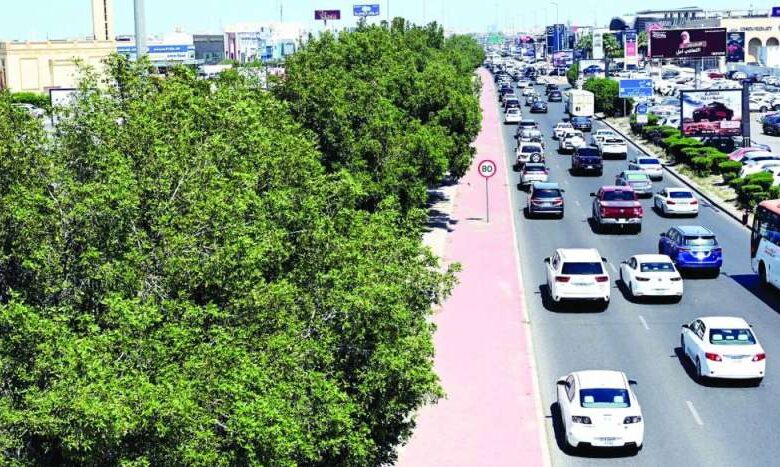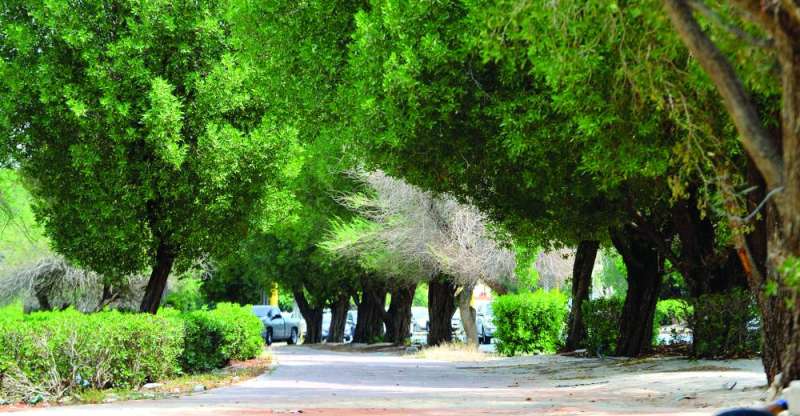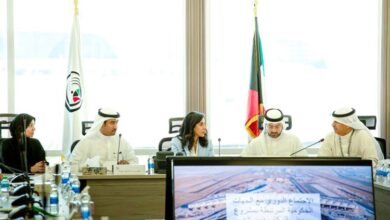Greening Kuwait: Seven contracts signed for afforestation, maintenance
Kuwait has recommenced efforts to afforest and beautify roads following years of neglect due to tree deaths and expired maintenance contracts, in the waste of millions of dinars previously spent on afforestation.

- The cosmetic agriculture sector forms a committee to oversee winning companies, ensuring contract terms are met. It’s addressing recent monitoring deficiencies, focusing on specific highways.
- Interest in cosmetic agriculture projects in Kuwait started in the early seventies, with Kuwait being a pioneering country among the Arab Gulf nations in this field
The efforts to afforest and beautify roads in Kuwait have resumed after years of neglect due to trees dying and maintenance contracts not being renewed. This oversight has resulted in the waste of millions of dinars previously spent on afforestation.
Al-Rai newspaper surveyed the efforts of the Public Authority for Agriculture Affairs and Fisheries, an environmental activist, and an engineer. Informed sources within the authority revealed to the newspaper that the authority signed seven contracts with companies specialized in afforestation and plantation maintenance during the holy month of Ramadan. It is expected that work will commence in May.
Sources stated that the seven contracts are part of the 13 contracts submitted to the Central Tenders Committee two years ago.

The remaining six contracts are awaiting signing to fulfill the needs of regions in the north and south of the country. This anticipation aims for a greener summer and an increase in green spaces in the country, which suffered from neglect leading to the death of thousands of trees due to delays in signing maintenance contracts.
Sources added that the cosmetic agriculture sector is forming a committee to monitor the work of the winning companies and ensure proper implementation of contract terms. They explained that the sector recently faced a deficiency in monitoring contract implementation, primarily focusing on highways like Abdali, Salmi, and Nuwaiseeb, as well as internal highways.
Cultivating varieties that are compatible with environment and weather is crucial.
 Environmental activist Barak Al-Hindal expressed dissatisfaction with the declining level of cosmetic plantings, whether on highways, public squares, gardens, or parks managed by the General Authority for Agriculture and Fisheries.
Environmental activist Barak Al-Hindal expressed dissatisfaction with the declining level of cosmetic plantings, whether on highways, public squares, gardens, or parks managed by the General Authority for Agriculture and Fisheries.
He stressed that this decline has led to the loss of both fruitful and non-fruitful trees, which were planted and nurtured under tenders and government practices involving the Agriculture Authority, companies, and institutions. These trees, he emphasized, are national assets regardless of their productivity.
Al-Hindal pointed out that during the months of June, July, and August last year, it became evident that there was no follow-up on these plantings. This lack of oversight resulted in the death of thousands of trees that adorned the shoulders of main and secondary public roads. This occurred either due to expired contracts or contractors failing to adhere to contract terms, leading to tree destruction. The remains of these trees are still visible on the main roads, and they have not been removed until now.
He believed that supervisory authorities, such as the National Assembly and its oversight arm, the Audit Bureau, along with the Financial Controllers Agency and the Anti-Corruption Authority “Nazaha,” should oversee these projects actively. They shouldn’t rely solely on citizens’ voluntary and commendable campaigns to provide water tanks for watering these plants.
He also urged the Agriculture Authority to enhance coordination with regulatory authorities to monitor contract implementation.
He expressed hope that the authority would prioritize cultivating varieties suitable for Kuwait’s environment and weather, and diversify crops to prevent the spread of viruses among them.
Deterioration due to specialists’ negligence and their replacement by inexperienced ones: Al-Zalzala
 Dr. Hani Al-Zalzala, Vice President of the Society of Agricultural Engineers and an environmental researcher, considers cosmetic agriculture and greening vital due to their environmental, health, and aesthetic significance for civilized nations.
Dr. Hani Al-Zalzala, Vice President of the Society of Agricultural Engineers and an environmental researcher, considers cosmetic agriculture and greening vital due to their environmental, health, and aesthetic significance for civilized nations.
He notes that interest in cosmetic agriculture projects in Kuwait started in the early seventies, with Kuwait being a pioneering country among the Arab Gulf nations in this field. Kuwait celebrates Greening Day every October to highlight these efforts.
Sending students abroad for cosmetic agricultural studies
Al-Zalzala explained that since the 1980s, many students have been sent to the best universities worldwide to study cosmetic agricultural sciences and engineering. This initiative aimed to beautify Kuwait and enhance its urban environment. Projects for greening and expanding the green areas in Kuwait became known as the Lebanon project, and efforts were directed toward taking the correct steps. The “Supreme National Greening Plan (1988-2015)” was then implemented.
Al-Zalzala was surprised by the crisis emerging in greening projects across the country, especially in recent times. The sector has begun to experience a deteriorating situation, evident in the death of numerous trees across various projects, regions, main ports, and roads.
Their lack of sustainability and damage has cost the state substantial amounts of money, highlighting the supervisory authorities’ lack of ability and knowledge in tree management and care. Some attempt to attribute blame to illogical reasons to justify shortcomings and the decline of green spaces.
He emphasized the importance of relevant government agencies paying attention and accelerating the development of sustainable and successful solutions to assist the landscape agriculture and greening sector in achieving its desired goals.
He pointed out that the deterioration results from various factors: officials’ lack of experience or individual decision-making, neglect of specialized experts in the country, failure to implement recommendations from research bodies, absence of regulatory and supervisory bodies for ongoing development, inability to improve the sector, and adherence to outdated mentalities and methods that don’t align with development. These issues affect the quality and sustainability of cosmetic agriculture.
Additionally, the sector experiences staff alienation and local agricultural engineers migrating away due to a lack of incentive benefits, leading to their replacement by non-specialized individuals.
Al-Zalzala explained that officials in all ministries, agencies, universities, and institutes in the country have a role in addressing the problem and prioritizing it. The significance of the cosmetic agriculture sector, with its environmental, aesthetic, and health benefits, cannot be underestimated or undervalued.
Three solutions
- Reopening scholarships for accredited international universities to study bachelor’s degrees in cosmetic agricultural sciences.
- Establishing supporting specializations in local universities to compensate for the shortage of local Kuwaiti cadres.
- Foster joint cooperation and coordination among all government institutions to correct and develop cosmetic agriculture in general, avoiding reliance on a single party.













